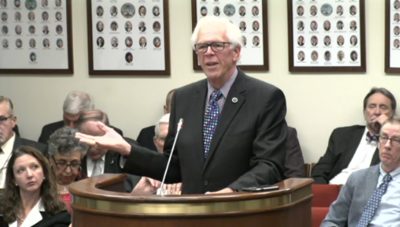State Rep. Bill Taylor, R-Aiken, made the right call in December of 2017 when he attempted to introduce his "DUI-E" bill into this year's legislative session.
The rest of the South Carolina didn't see it that way, and the bill never made it to vote during this session.
The bill, if one remembers, was known as "Driving Under the Influence of an Electronic Device," or "DUI-E" for short, and would prohibit drivers from holding a phone in either hand. Drivers also would not be allowed to read, send or write text-based communications.
If caught, violators would have faced a $100 fine on first offense and a $300 fine on subsequent offenses. In addition, two points would be added to the offender's driving record and violations would be reported to the driver's insurance company. Taylor was even willing to reduce the bill at one time and not put the points issue on the bill.
At least it would impact drivers more than it does now.
South Carolina does have a driving and texting ban, but it's so minor it shouldn't even be mentioned.
If caught and proven guilty – which, essentially, requires an admission of guilt from the driver – drivers face a $25 fine.
"It's just a watered-down bill," Taylor said. "It was a worthless bill, but it was at least a start."
For the driver in Aiken County, the current law is basically meaningless.
Any driver can keep one hand on the wheel and one hand with their phone – its quite the juggling act – but anyone can see the driver next to them doing it every day. However, if someone drives into Augusta, they will see a different act starting Sunday.
The "Hands-free Georgia Act" takes effect July 1, and like Taylor's bill will hit hard if a driver is so much as holding a phone – even at a stop light.
Under the bill, holding a phone at all while driving is prohibited; even when stopped for a traffic signal or stop sign.
The use of cellphones will be allowed only when making emergency calls to report a traffic crash, criminal activity, fire, medical emergency or hazardous road conditions. Drivers will also be allowed to text if they are using technology that converts voice to text messages.
The first offense for drivers will be a $50 ticket and one point on your driving record.
This penalty isn't as severe as the bill Representative Taylor introduced, but it will hurt.
Funny, but Georgia moved their bill through after Taylor presented his plan.
Georgia passed it, and it's done. South Carolina ...
"We are slow," Taylor said. "If Georgia is the 16th state to pass such a law, we could be the 17th state. But we will do what South Carolina does and be the 47th state."
There is no doubt Taylor wants to get the bill passed ... and quickly. He is absolutely correct.
Of course, the obvious intention is to keep driver's attention where it should be, on the road.
According to the Department of Motor Vehicles (DMV.org) in the United States: 26 percent of all car crashes in 2014 involved cellphone use; at least 9 people are killed every day because of a distracted driver; more than 1,000 people are injured every day due to a distracted driver; in 2015, 42 percent of teens say they have texted while driving – and texting and driving is the leading cause of death in teens.
The list of distracted statistics gets longer every day.
Having a cellphone is a convenience, but it is also a bad habit. Introducing stiffer penalties can help drivers break that habit.
Georgia is driving in the right direction, South Carolina needs to as well.



